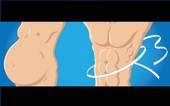3 So-Called "Healthy" Foods that You Should STOP Eating (if you want a lean healthy body)
by Mike Geary, Certified Personal Trainer, Certified Nutrition Specialist
Author of the best-seller: The Truth About Six Pack Abs
I was reading a statistic in a nutrition book recently, and this is going to shock you...
Now before I tell you the statistic, let's keep an important fact in mind... according to well renowned nutrition author Michael Pollan, and his amazing book called
In Defense of Food, humankind has historically consumed approximately 80,000 different species of edible plants, animals, and fungi, and approximately 3,000 of those have been widespread foods of the human diet.
Now get ready for a shocking and appalling statistic...
Currently, the average adult eating a typical modern western diet in countries such as the US, Canada, Australia, etc consumes approximately
67% of their total caloric intake from
only 3 foods -- CORN, SOY, AND WHEAT (and their derivatives).
What would be considered a reasonably healthy amount of corn, soy, and wheat in the human diet? Based on 10's of thousands of years of human history, and what the natural diet of our ancestors was (indicating what our digestive systems are still programmed to process), this would probably be in the range of about 1% to 5% MAX of our total calories from corn, soy, and wheat.
Considering that modern humans are eating 67% of their total calories from corn, soy, wheat... you can see why we have massive problems in our health, and our weight!
It's not a surprise that we have so many intolerances and allergies, specifically to soy and wheat (and gluten intolerance)... the human digestive system was simply never meant to consume these substances in such MASSIVE quantities.
Keep in mind that these massively high levels of corn, soy, and wheat in our modern human diet is a relatively new phenomenon that originated from the
economics of the multi-billion dollar corn, soy, and wheat industries. It really HAS been all about the money... NOT about our health!
By "derivatives" of corn, soy, and wheat, this means the food additives such as:
- high fructose corn syrup (HFCS)
- corn oil
- soybean oil (hydrogenated or plain refined)
- soy protein
- refined wheat flour
- hundreds of other food additives such as maltodextrin, corn or wheat starch, soy lecithin, mono and diglycerides, etc, etc
This doesn't surprise me... consider how much soda or other sweetened drinks (with loads of HFCS) that the average person drinks daily... this is a LOT of calories from just 1 sole corn derivative. Even
marinades, salad dressings, ketchup, breads, and 100's of other foods contain loads of belly-fattening HFCS!
Also think about how many processed foods we have that are either fried in soybean or corn oil... and even if the foods are not fried in these oils, these oils are additives to almost every processed food... chips, candies, cakes, salad dressings, tomato sauces, burrito wraps, corn chips, breaded chicken, etc, etc. This is a LOT of calories from these 2 other corn and soy derivatives... both of them EXTREMELY UNHEALTHY!
On top of that, think about how much breads, cereals, pastas, muffins, and other highly processed wheat products that most people consume each day. Again, this is LOADS of unhealthy, blood-sugar spiking, nutrient-poor calories, that more than half of the population has some degree of intolerance to anyway.
It gets even worse!
Not only are we eating 67% of our total calories from corn, soy, and wheat... but because of the economics involved (specifically with cheap corn and soy) we are also feeding
most of our farm animals corn and soy now too... again amplifying the amount of corn and soy that passes through the food chain and (from a biochemical standpoint) ends up in our bodies.
Probably the 2 worst examples of this blatant mismanagement of our food supply is how our factory farmed chickens and cows are fed.
Cows are fed mostly corn in factory feedlot farms, even though their digestive systems are only meant to eat grass and other forage. This makes the cows sick (hmm... E-coli anyone?), alters the omega-6 to omega-3 ratio of the fats to unhealthy levels, and also diminishes the healthy CLA fats that would occur naturally in
grass-fed beef. All of these problems go away if our cows are fed what they were made to eat naturally - grass!
Our chickens are also fed a diet of mostly corn and soy and crowded in tight pens in horrendous conditions... when the fact is that a chicken was meant to roam around the outdoors eating a mixture of greens, insects, worms, seeds, etc. When chickens are kept inside in tight quarters and fed only grains, it leads to an unhealthy meat for you to eat, and less healthy eggs compared to free-roaming chickens allowed to eat an outdoors diet.
Our food supply has gotten so screwed up that we're even feeding our salmon and other farmed fish corn and soy...again because of the economics involved. How ludicrous is this, considering that fish are meant to eat a diverse diet of smaller fish, worms, bugs, etc. Again this makes farm raised fish unhealthy in terms of nutrition compared to the wild counterparts. If you want to see something even scarier about farm-raised fish, watch this
quick video about the toxic fish you might be buying.
So even when you're eating chicken, beef, and fish, you're still essentially getting even MORE corn and soy into your body...considering that the cows, chickens, and farmed fish ate mostly soy and corn.
So it's actually WORSE than just 67% isn't it!
Why is it so unhealthy to consume 2/3rds of our calories from corn, soy, and wheat?
Well, this section could encompass an entire book, so to keep this short, I'll just throw out a few random reasons...
- Skews the ratio of omega-6 to omega-3 fats in our diet to as high as 30:1, when a ratio of 1:1 to 2:1 is considered healthy.
- Problems with gluten intolerance (related to heavy wheat consumption)
- Problems with weight gain, blood-sugar swings, and reduced insulin sensitivity (and progression of diabetes) due to excessive refined corn and wheat flours, as well as HFCS in our diet
- Soy and corn are the most genetically modified crops (which also allows more pesticides and herbicides to be used, which are usually "xenoestrogens")
- Many of the pesticide and herbicide residues in these crops are xenoestrogens, which can increase "stubborn" belly fat
- Soy products and derivatives contain a double-whammy of xenoestrogens as well as phytoestrogens... again creating an environment in your body for fat storage, carcinogenic effects, and even "man boobs" for some men in very severe cases
- The feeding of corn and soy to animals reduces the health and nutritional benefits of those animal products
- and the list could go on and on and on...
So how do you avoid all of this overwhelming amount of corn, soy, and wheat in our food supply, and finally take control of your weight and your health?
1. Don't purchase processed foods! It all starts with your grocery cart discipline... choose only 1-ingredient foods such as fruits, veggies, beans, eggs (free roaming), nuts, seeds, and meats from grass-fed or free roaming animals that are raised correctly. Only resort to junk foods or processed foods on a 1-day per week "cheat day" but ONLY when dining out... that way, the processed foods aren't in your house to tempt you.
2. Get most of your carbs from fruits and veggies instead of grains.
3. Avoid store bought salad dressings as they almost always contain soybean oil and HFCS (instead, try my homemade healthy salad dressing)
4. Make sure that your tomato sauces don't have HFCS and soybean oils... look for sauces made with olive oil instead. Remember to avoid unhealthy canola oils too!
5. If you like guacamole (one of the healthiest snacks on the planet!), try veggie sticks with guacamole instead of genetically-modified, oil-soaked corn chips
6. If you like hummus, try veggies sticks with hummus instead of pita chips or other bread.
7. Reduce your cereal, bread, and pasta intake by having these foods only on "cheat days" and stick to more of the 1-ingredient foods I mentioned in #1 above. Try some of these healthy snacks as good alternatives (yes, I know that one of the 13 snacks on there has sprouted grain, which is fine on occasion).
I could go on with more examples, but I think that's good for now.
So with all of this said...
Is my diet perfect? Well, no of course not! Nobody is perfect, and I can give in to temptation on occasion just like anybody else.
However, I'd estimate that my corn/soy/wheat consumption is only about 2-4% of my total caloric intake compared to 67% for the average person. The way that I achieve this is to simply not bring any corn, soy, or wheat products into my house, so I'm never tempted by it. Therefore, at least 6 days/week, I eat virtually no corn/soy/wheat, except for the occasional piece of sprouted grain toast a couple times a week (which is a better option than typical "whole grain" bread).
I do, however, give in and sometimes eat breads, pasta, and even corn chips, etc. when I'm dining out. I see these as my cheat meals and try to do this no more than once per week. I still completely eliminate sodas and deep fried foods though...they are just TOO evil!
Please share this article with your friends and family on email, Facebook, Twitter, blogs, forums, etc... this is one of the MAJOR reasons that we are so
unhealthy and overweight as a society... 67% of our calories from just 3 foods (and their derivatives) is an appalling statistic! Don't give in to the marketing machine that is the corn, soy, and wheat industries! Take control of your OWN health instead of letting big corporations take control of your health.
If you liked this article, please Share it with your friends:
WATCH THIS QUICK VIDEO ON TOXIC FOODS AND 6 PACK ABS
http://www.truthaboutabs.com/ab/?hop=selftalk12
 We all know by now that soda (aka "pop" in some areas) is one of the most evil things you can put in your body... the nasty chemicals, the gut-fattening high fructose corn syrup, and a myriad of health problems caused by this carbonated cocktail worshipped by those that don't care about their health or body.
We all know by now that soda (aka "pop" in some areas) is one of the most evil things you can put in your body... the nasty chemicals, the gut-fattening high fructose corn syrup, and a myriad of health problems caused by this carbonated cocktail worshipped by those that don't care about their health or body.

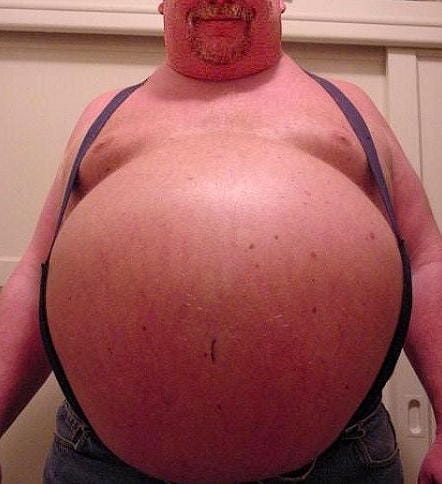 Although this picture depicts an extremely overweight man, this article applies to dangerous types of fat inside the bodies of both men and women... and this discussion also applies even if you only have a slight amount of excess stomach fat.
Although this picture depicts an extremely overweight man, this article applies to dangerous types of fat inside the bodies of both men and women... and this discussion also applies even if you only have a slight amount of excess stomach fat.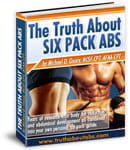
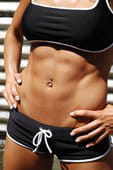 If you're already a reader of my
If you're already a reader of my  This idea of "ab vacuums" while driving is just one of the dozens of tips and tricks found inside my Truth about Six Pack Abs manual. If you don't already have a copy, see what other
This idea of "ab vacuums" while driving is just one of the dozens of tips and tricks found inside my Truth about Six Pack Abs manual. If you don't already have a copy, see what other 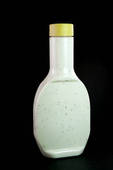 If you want to eat truly healthy, support your fat loss goals, and avoid some of the nasty additives in processed food, one thing you should
If you want to eat truly healthy, support your fat loss goals, and avoid some of the nasty additives in processed food, one thing you should 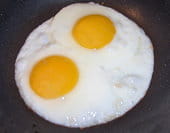 I was on a weekend trip with some friends recently and one of my friends was cooking breakfast for the whole group. I went over to see what he was cooking and saw he was getting ready to make a big batch of eggs.
I was on a weekend trip with some friends recently and one of my friends was cooking breakfast for the whole group. I went over to see what he was cooking and saw he was getting ready to make a big batch of eggs.
